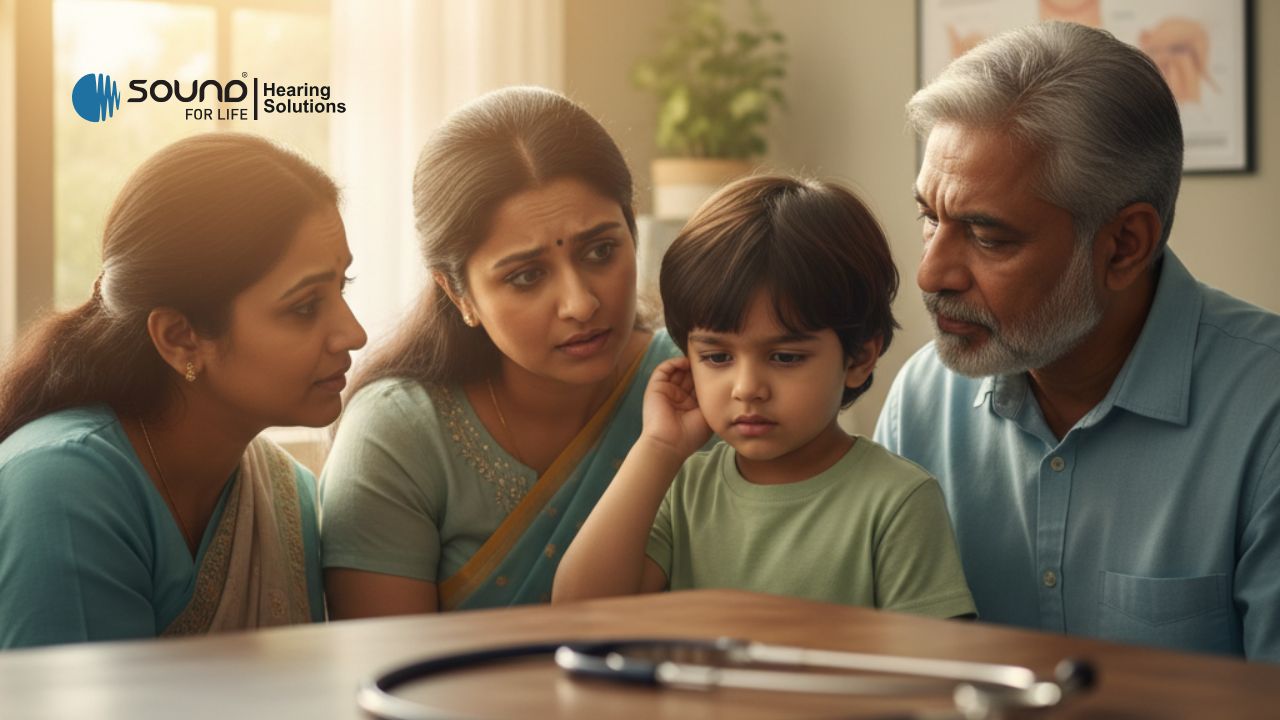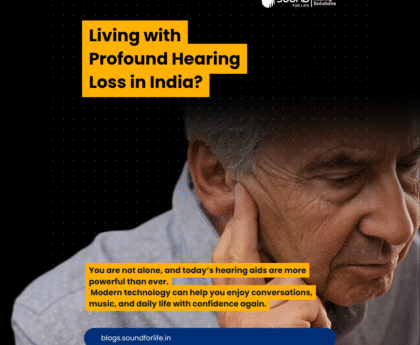Our ears are one of the most important sense organs, but it is often overlooked. But we often only notice them when something hurts or stops working. In India, where adults and kids are often exposed to environments that can increase the risk of ear infections. Like kids playing outdoors, cities are dusty, and many people swim or live in polluted areas, ear infections are common.
The good news: most ear problems are treatable and many can be avoided with a little care and attention.
Quick Answers:
Can ear infections cause hearing loss?
Yes. Repeated or untreated ear infections can damage the eardrum, middle-ear bones, or inner ear structures and may lead to temporary or permanent hearing loss. Early treatment, hearing checks, and follow-up can prevent long-term damage. Book a hearing evaluation with SFL Hearing Solutions if you suspect infection-related hearing problems.
When should I visit an ENT or audiologist?
See an ENT or audiologist if ear pain, discharge, fever, or hearing difficulty lasts more than 48 to 72 hours, or immediately for sudden hearing loss, severe pain, head injury, or high fever. For routine concerns and follow-up after infection, contact SFL Hearing Solutions to schedule timely assessment and tests.
How can I prevent ear infections?
Prevent ear infections by keeping ears dry, avoiding inserting objects into the ear, treating colds and allergies early, maintaining a smoke-free home, and using ear protection while swimming. Regular check-ups and vaccinations reduce risk. For personalised prevention tips and family plans, consult SFL Hearing Solutions.
What if hearing doesn’t return after an infection?
If hearing doesn’t return after an infection, get a hearing test to check for fluid, eardrum damage, or other issues. Audiology tests (audiogram, tympanometry) identify causes and guide treatment. SFL Hearing Solutions offers evaluations, treatment plans, and hearing-support options such as hearing aids if required.
What is an ear infection?
An ear infection happens when part of the ear gets inflamed or filled with fluid because of bacteria or a virus. It can affect the outer ear (the part you see), the middle ear (behind the eardrum), or the inner ear (which helps you hear and balance). Children get ear infections more often because their ear tubes are shorter and can get blocked easily.
The three main types of ear infections are:
Types of Ear Infections
- Outer Ear Infection (Otitis Externa)
- Often called “swimmer’s ear.”
- Caused by water remaining in the ear canal, bacterial infection, or injury.
- Symptoms: Pain, redness, swelling, and sometimes discharge.
- Middle Ear Infection (Otitis Media)
- Common in children, often following a cold or respiratory infection.
- Fluid accumulates behind the eardrum, causing pressure and discomfort.
- Symptoms: Ear pain, fever, irritability (in children), temporary hearing loss.
- Inner Ear Infection (Labyrinthitis)
- Less common but can be serious.
- Often caused by viruses.
- Symptoms: Vertigo, nausea, balance problems, and hearing loss.
How Ear Infections Can Lead to Hearing Loss
Most hearing loss from an ear infection is temporary. Still, if infections repeat or go untreated, they can cause permanent damage. This can happen because:
- Fluid blocks sound from reaching the inner ear.
- The eardrum can get a hole or scar from a bad infection.
- Tiny bones inside the ear can get damaged.
- In rare cases, the inner ear itself is affected.
For young children, even small hearing problems can slow down speech and learning so early action matters.
Why ear infections are common in India
A few reasons make ear infections more likely here:
- Children catch colds easily at school.
- Pollution and dust irritate the nose and throat, which affects the ears.
- Swimming in dirty water can cause outer ear infections.
- Allergies to dust or pollen are common.
- Exposure to second-hand smoke raises the risk for kids.
Signs That You Should Watch For:
In children
- Pulling or rubbing their ear
- Constant crying or trouble sleeping
- Fever
- Fluid or pus from the ear
- Not responding to sounds or delayed speech
In adults
- Ear pain or pressure
- Trouble hearing clearly
- Ringing (tinnitus)
- Discharge from the ear
- Dizziness or balance problems
If these signs last more than a day or two, consult a qualified ENT specialist promptly.
Simple ways to protect your family’s ears
1. Wash hands often
- Little germs travel fast. Washing hands before touching kids’ ears or cleaning around the face helps stop infections before they start.
2. Don’t poke inside the ear
- Cotton buds, pins, matchsticks or any small stick-like things can push wax and hurt the ear. Clean only the outer part of the ear with a soft cloth.
3. Keep ears dry after water exposure
- After swimming or bathing, tilt your head and gently pat the ear dry with a towel. If someone swims a lot, use soft earplugs or a swim cap to keep water out.
4. Protect ears in noisy places
- At concerts, fireworks, factories, or loud gatherings, wear earplugs or step away from the loudest areas. Even short bursts of very loud noise can add up.
5. Turn down the volume on devices
- Teach kids and adults to keep phone and headphone volumes at a safe level — if someone else can hear your music, it’s too loud. Use volume limits on devices when possible.
6. Keep the home clean and smoke-free
- Dust and cigarette smoke irritate noses and ears. A cleaner, smoke-free home means fewer sniffles, fewer infections, and healthier ears.
7. Treat colds and allergies early
- Colds and blocked noses can lead to ear pain or infections. Rest, fluids, and seeing a doctor when symptoms are bad can stop small problems from turning bigger.
8. Store small objects safely from children
- Buttons, beads, and small toys are choking hazards and can get stuck in little ears. Keep them out of reach and check toys for loose parts.
9. Don’t ignore ear pain or changes in hearing
- If someone has ear pain, discharge, ringing, or sudden trouble hearing, get it checked by a doctor. Early care usually makes the problem easier to fix.
10. Ensure Timely Vaccinations
- Vaccines such as pneumococcal and influenza vaccines can reduce the risk of infections.
11. Regular Hearing Check-Ups
- Early detection of hearing loss can prevent long-term complications.
- Children should have their hearing screened before school age.
What to expect from treatment
The nature and severity of the infection determine the treatment:
- Antibiotics (only if the doctor believes it’s bacterial)
- Medicines that help with pain and swelling
- Ear drops for infections in the outer ear
- Minor surgery, such putting tubes in the ears, for issues that keep coming back
- Hearing support: If you still have hearing loss, hearing exams, hearing aids, or treatment can assist.
Always follow the full treatment course your doctor gives. Do not quit medicine on your own without the advice from the specialist as it can let the infection come back.
When hearing doesn’t come back right away
If hearing is still low after the infection, there could be fluid in the ear, eardrum damage, or lasting problems. In children, this can slow down talking and learning so don’t wait. Get a hearing test and follow-up care.
How families can support a child or relative
Watch for warning signs and act quickly.
- Keep up with doctor visits and medicines.
- Teach children safe ear habits (no inserting objects).
- Avoid loud places while your ears are healing.
Be patient, recovery can take time, and some children need extra help with speech.
When to visit an ENT or audiologist
If any of these happen, you should see an ENT or audiologist. They can figure out what’s wrong and provide the necessary tests, medications, or hearing aids.
- If your ear discomfort doesn’t go better after two or three days of home treatment (warm compress, pain management), come in within 48 to 72 hours.
- Clear fluid, pus, or any other fluid that keeps coming out of the ear.
Get urgent help right away if:
- Sudden loss of hearing in one or both ears, this needs immediate attention.
- Very high fever (for example, about 39°C / 102.2°F or higher) with ear symptoms.
- Severe pain, bleeding, or if the ear was hit or there was head trauma.
See a specialist when problems keep coming back or don’t fully resolve:
- Repeated ear infections or ongoing fluid in the ear (this can affect hearing over time).
- Hearing still seems reduced after the infection is treated, if hearing doesn’t get better, get tested.
Other signs that mean you should see someone:
- Ongoing dizziness, balance problems, or feeling unsteady.
- Ringing or other noises in the ear (tinnitus) that won’t go away.
- A foreign object stuck in the ear, especially in a child.
- Babies or very young children who are unusually fussy, pulling at their ear, feeding poorly, or have a fever seek prompt care.
- New or worsening ear symptoms after a course of treatment.
What a specialist can do
- Examine your ear with an otoscope and check how the eardrum looks.
- Run hearing tests (audiogram), middle-ear tests (tympanometry), or other checks to measure hearing and middle-ear function.
- Offer treatments: medicines, safe ear cleaning, drainage or grommet advice, or hearing-support options if needed.
SFL Hearing Solutions: Helping Indian Families Hear Better
At SFL Hearing Solutions, we understand the importance of protecting your loved ones hearing health. Here are some of the services we provide:
- Comprehensive hearing assessments
- Guidance on how to prevent ear infection
- Hearing aids and assistive listening devices
- Personalized care plans for children and adults
By addressing ear infections early and monitoring hearing health, families can prevent long-term complications and ensure better quality of life.
Important Points
In India, ear infections are frequent in both kids and adults.
- If ear infections keep coming back or aren’t properly treated, they can damage the structures of the ear over time and may cause partial or permanent hearing loss so get them checked and treated promptly.
- Identifying early symptoms is very important.
- Good hygiene, ear protection, and getting vaccines on schedule are all ways to lower the risk.
- Regular hearing tests can find problems before they cause serious damage.
FAQ:
Due to dust, pollution, frequent colds, and swimming in unclean water, ear infections are common among Indian families.
Yes, if untreated, they can affect speech and learning. Regular ENT visits and early care are essential.
Watch for ear pulling, irritability, fever, or fluid discharge. If these signs persist, consult SFL Hearing Solutions.
Most cases are temporary, but recurring infections can cause lasting damage. Early treatment and hearing support help recovery.
Doctors may prescribe antibiotics, ear drops, or minor surgery. SFL Hearing Solutions provides guidance and follow-up hearing care.
Take action today
Protecting your family’s hearing starts with awareness and early steps to prevent it. If you or your child exhibit any signs of an ear infection or hearing loss, don’t wait, early treatment can save further damage. Book an appointment with SFL Hearing Solutions today for thorough assessment of hearing and take the first step toward healthier ears and better hearing.
Disclaimer: This article is for educational purposes only. It should not replace medical advice. Always consult a qualified ENT specialist or audiologist for diagnosis and treatment.





